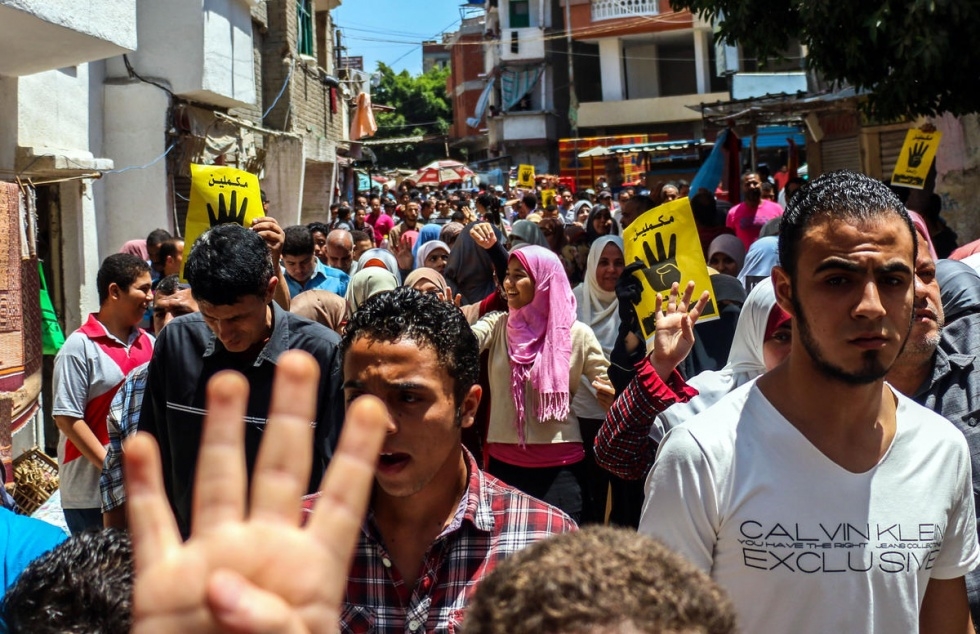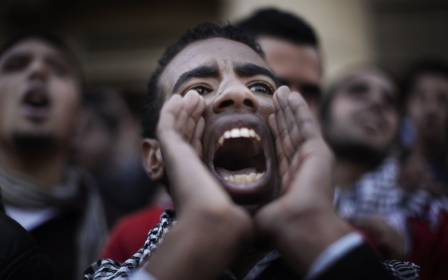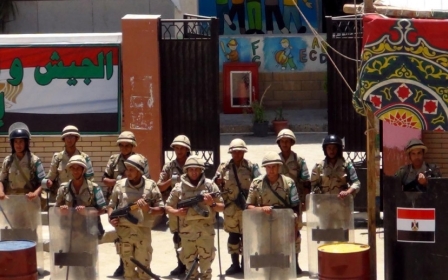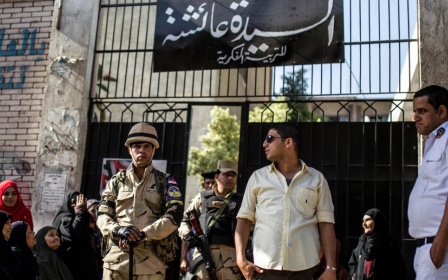Egypt's 'blind' justice leads many to boycott polls

On 28 April 2014, Hezbit Kamun, a small town in Upper Egypt, became famous when some of its villagers where among the 683 people sentenced to death by Judge Said Youssef for assaulting the El-Edwa police station and the killing of a policeman. This and another previous mass death sentence, were issued only a few months after the Muslim Brotherhood had been declared a terrorist organization.
Asmee is the third wife of Sheikh Mostafa, a local teacher in Hezbit Kamun, and one of the defendents accused of assaulting and burning a police station in Minya in August as Cairo security forces cleared the Nahda and Rabaa sit-ins. She lives here with her two children and the children of Mostafa’s other wives. She is his third.
“When police came, they took my husband, insulted me and slapped one of the kids,” says Asmee. “We are victims of injustice, my husband is a victim of injustice. He is a blind man, he can hardly see a cup of water in front of him: how can a man like him destroy properties, put police stations on fire and kill a man?”
Last time she visited her husband in Wadi El-Natrun Prison, a five hour drive from her village, was one week ago. “I went there with other families of prisoners. We could only get through the fence, but we were not allowed to visit and see them. We cried and begged the warden until he let us in,” she recalls.
Shortly after the ouster of former president Mohamed Morsi, security forces began sweeping the country in a widespread search for members of the Muslim Brotherhood. Soon, accusations of terrorism were thrown at anyone allegedly supporting the Muslim Brotherhood, sympathising with their cause or even expressing an opinion contrary to the new regime.
New MEE newsletter: Jerusalem Dispatch
Sign up to get the latest insights and analysis on Israel-Palestine, alongside Turkey Unpacked and other MEE newsletters
“I was a supporter of President Morsi,” Asmee affirms. “I believe he would have been a good president, but he didn’t have time. I know the Muslim Brotherhood tried to solve problems by creating some others, but looking at the country right now, I think it is completely destroyed. Kidnappings and robberies keep going on, justice is over.”
The first trial lasted a mere 100 minutes and the judge did not hear the defense.
Hassan Sabir, a lawyer whose 35-year-old brother, Haggag, was sentenced to death on 28 April, condemns the way the arrest and the trial were conducted. "Tens of masked policemen broke into his house in Atf Haydar and arrested him on 18 September," the lawyer says on the phone. Haggag was charged with 11 allegations, including vandalism, damage of properties and murder of a policeman on 14 August. “But this is not true," Hassan said. That day Haggag, who runs a small bookshop when he doesn’t work as an electrician for a public company, was buying stock for his store at the Faggalah market, in Cairo. "We have proof, there are receipts showing that my brother wasn’t there".
“It's entirely illegal,” Tarek Ibrahim Fouada, the President of the Minya Bar, told the the Middle East Eye. "I am against the Muslim Brotherhood, but if I accept that this might happen to them now, I can expect it to happen to me later . . . The judge acted very strangely in the courtroom saying the verdict would have been issued on Monday, whether we liked it or not, and it didn't last more than 45 minutes. No one can violate legal procedures in Egypt, and if it's done by a judge is a disaster."
After almost one year since Morsi's ouster and the following dispersal of the Rabaa and Nahda sit-ins Most of the Muslim Brotherhood leaders are in prison or abroad. The Egyptian government officially declared that the group was a terrorist organization in December 2013. The Independent Statistical Database WikiThawra registered 41,163 prisoners incarcerated and prosecuted in the period between July 2013 and April 2014. Among them, 166 journalists, 4768 students and 976 minors, while 1714 are accused of terrorism.
Soon after the removal of Morsi, students sympathethic to former president Morsi and some groups belonging to the Islamist political area , among them the Muslim Brotherhood, joined their forces within the Students Against the Coup (SAC) Movement or similar umbrella organizations for workers. Protests in universities and campus continue and clashes with security forces provoked at least 17 victims among students during the current academic year.
With the leadership in jail, funds frozen and media extensively controlled, universities have become an important space for opposition movements, and not only for the Muslim Brotherhood. SAC spokesperson, Youssof Salhen, claims, “SAC does not have anything to do with Muslim Brotherhood,” but refused to give further information.
An Al-Azhar student, who prefers to remain anonymous, staunchly defends his right to fight for freedom and justice. “We don’t bring any political symbol during our demonstrations, we just want to restore legitimate rule of law,” the student says. “When revolution started, I was a high school student and I did not know anything about politics. Now, I can tell you, I boycott this election because it is undemocratic,” Mohammed, a Cairo University student who supports the Muslim Brotherhood. Mohammed says he will not go to cast his vote because “all what happened in Egypt is illegal. We will not give up. We will continue our protests against this regime till our requests are fulfilled.”
Student activism might have consequences in the balance between old and young generations within the Muslim Brotherhood, pushing the second to claim a major influence in the decision-making process. Today, group members don’t speak too much and rarely use recognisable symbols for fear being targets of the mass campaign against their group. Since Morsi’s ouster, 10,000 members have been arrested, while around 1,400 died. Bringing a leaflets or a pictures with the four-fingers Rabaa symbol, which the state associates with the Muslim Brotherhood, is enough to spend from 5 up to 25 years in prison.
In July 2013, a young Muslim Brotherhood member claimed to the Middle East Eye that a deal was under discussion between the conservative old leadership and the reformist young one for handing over power to younger members. Whether this internal debate really happened is unverifiable, but with top political leaders in prison, students and young members are increasingly involved in the movement’s management and new opportunities to acquire a more prominent role within it arise. But it is not clear in which direction they might steer the party line.
According to Khalil Anani, an expert on Islamic movements working for the Middle East Institute, there is a gap between the youth and the old leadership on the strategy and on how to deal with the regime. “Members at the top of the hierarchy think violence should be avoided, but some young members believe in a low-scale violence against police personnel as a way to face security apparatus. Their goal,” Anani said, “is to face the regime, trying to create problems and continuing street protest as the only way to mantain the organization.”
Providing security has become a central point of Sisi's presidential campaign. Voters also expect Sisi to solve the economic crisis. However, “neither Sisi nor Hamdeen Sabbahi, the leftist-socialist rival in these elections, seem to have any structural economic plan to face it,” says Fadhel Kaboub, professor of economics at Denison University. “They don’t face the root causes of the Egyptian difficulties: a high external debt driven by food imports and energy deficit.”
The Muslim Brotherhood promises a war of attrition against the army, according to a report published by Agence France Presse. They expect a total economic failure of the state so that people disaffection will spark a larger opposition movement that will lead the state to collapse, a Muslim Brotherhood source in the report explained. According to a recent Pew Research Center report, even if the Muslim Brotherhood supporter approval ratings declined from 63 percent in 2013 to 38 percent in 2014, only a slight majority (54 percent) approve the military takeover while 42 percent expressed a favourable opinion on Morsi as opposed to 54 percent who have a positive view of Sisi. This takes place despite the mass campaign against the Muslim Brotherhood and the popular support Sisi gained since last summer.
“I don’t care of this election and I will not cast my vote,” says Wael, a 28-year-old computer engineer from in Cairo.
In his tiny office, he watches a video on YouTube poking fun at Sisi. “There are a lot of videos like this. I voted for Morsi in 2012, but I will boycott this election because it comes after a coup,” he adds while his colleague Amr shows the Rabaa symbol with his right hand supporting Wael’s point of view.
“I have to take care of my children because my husband is in prison”, Asmee says looking at his picture. “I will not vote neither for Sisi, whom I consider a bad person, nor for Sabbahi, who is a simple picture card. Some people told me not tell those things in public” as to not be exposed as a pro-Muslim Brotherhood, but I am not afraid.”
Middle East Eye delivers independent and unrivalled coverage and analysis of the Middle East, North Africa and beyond. To learn more about republishing this content and the associated fees, please fill out this form. More about MEE can be found here.




